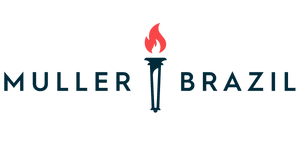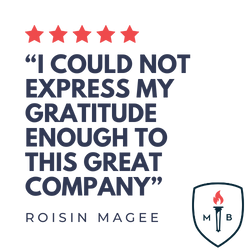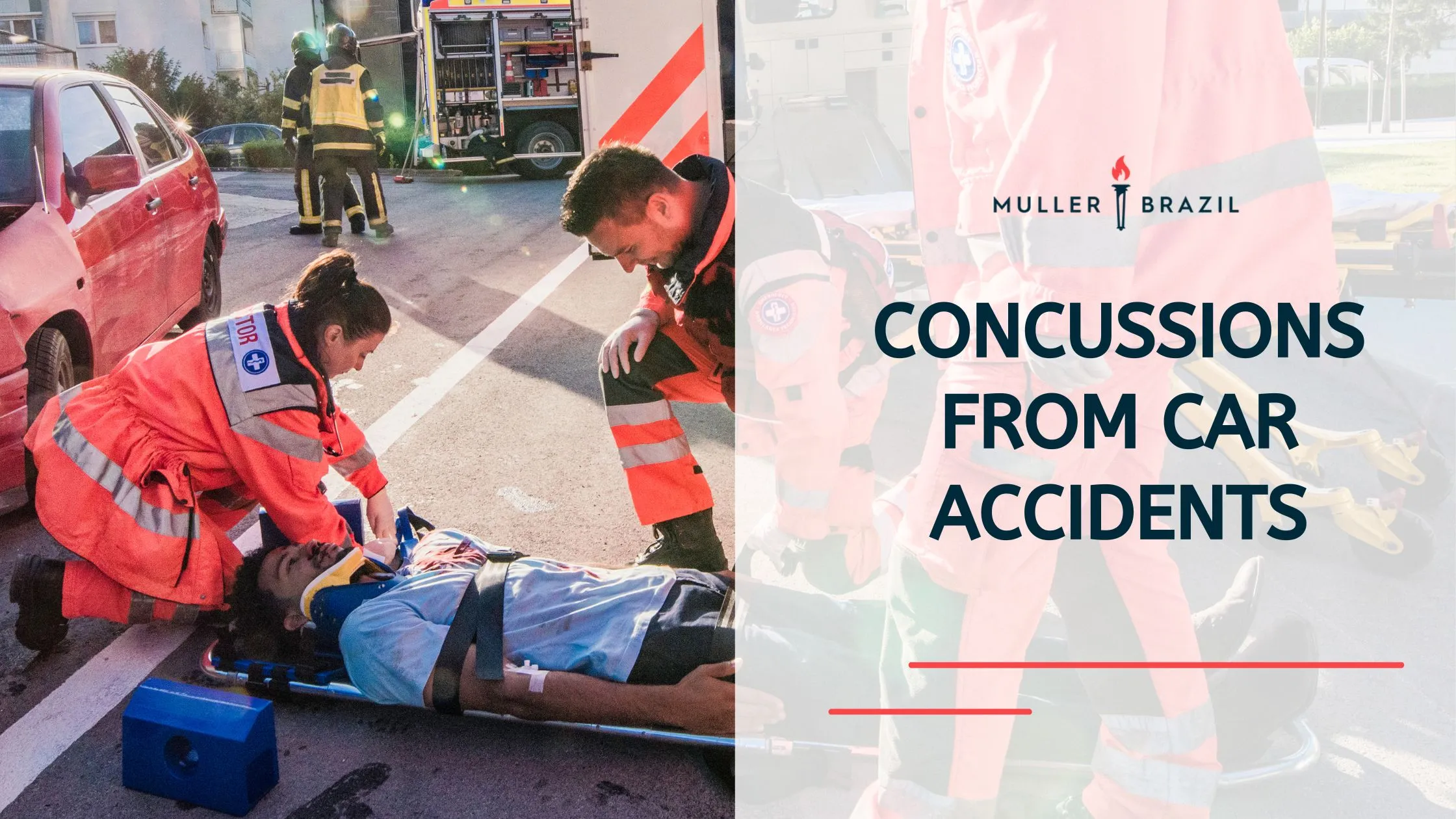6 min read
Understanding Concussions from Auto Accidents
![]() Paul R. Brazil, Esquire
Dec 14, 2023 11:09:00 PM
Paul R. Brazil, Esquire
Dec 14, 2023 11:09:00 PM
Recognize symptoms after a car accident, you may have a consussion, like headaches, dizziness, and mood swings, and seek medical help right away. Rest is key to recovery, and gradually getting back to normal activities under medical guidance is very important. Don't let financial stress from medical bills and lost wages overwhelm you—consider legal assistance to get the compensation you deserve
Key Takeaways
-
- Assess Collision Impact: Understand the severity of a car crash to gauge concussion risks effectively.
- Recognize Post-Accident Symptoms: Be vigilant for physical and emotional signs following an accident, as they could indicate a concussion.
- Immediate Medical Attention: Seek medical help promptly after a suspected concussion to ensure proper diagnosis and treatment.
- Rest for Recovery: Prioritize rest and recuperation post-concussion, followed by a gradual return to normal activities under medical guidance.
- Consider Legal Assistance: If necessary, explore legal options for compensation related to concussion injuries sustained in a car accident.
What is a concussion?
A concussion resulting from a car accident is a form of traumatic brain injury. It occurs when the head experiences a strike, blow, or jolt during the collision. Alternatively, the violent shaking of the head due to the sudden impact of the crash can also cause a concussion. It's not uncommon for individuals to experience a loss of consciousness as a result
Understanding Concussion Risks in Car Accidents
Car accidents present a notable hazard for head injuries, including car accident concussions, which are a type of severe head injury resulting from the brain impacting the skull. A concussion in a car accident can be caused by a bump, blow, or jolt to the head or even by an impact on the steering wheel. Recognizing the potential risks and warning signs of a car accident-induced concussion is important for your safety.
Seeking immediate medical attention after a car accident is crucial, regardless of the presence or absence of symptoms. A concussion-type injury may not be immediately apparent, and records of doctor visits may be necessary to prove that a concussion was sustained in the event of a personal injury claim or court case. Consulting a doctor early increases the likelihood of a successful recovery.
Symptoms of Concussions After a Car Accident
Concussion symptoms manifest in various ways, including cognitive difficulties, physical reactions such as dizziness or vision problems, and emotional fluctuations such as mood swings or irritability. These symptoms might not surface right after the accident, emphasizing the need to constantly monitor your health and seek medical help if any concussion signs are noticed.
Cognitive Hurdles
Cognitive symptoms associated with a concussion following a car accident include memory difficulties, difficulty maintaining concentration, and confusion. Memory issues that may arise from a concussion sustained in a car accident include:
- Post-traumatic amnesia.
- Recurrent memory issues following the injury.
- Difficulties with concentration and recollection.
A concussion sustained from a car accident can have a significant impact on concentration span, potentially resulting in difficulties with focus and memory problems. Confusion typically persists for a period of weeks to months following a concussion caused by a car accident.
Physical Reactions
Physical reactions to a concussion may include headaches, dizziness, vision problems, and sleep disturbances. Concussions can have a variety of sight-related symptoms. These include blurred vision, double vision, and difficulty focusing on objects. A concussion can disrupt the neurotransmitters in the brain, affecting the optic nerve and vision.
The usual causes of headaches following a concussion include head trauma, post-concussion syndrome, and post-traumatic headache. Being aware of these physical responses is necessary for appropriate care and recovery after a car accident concussion.
Emotional Fluctuations
Emotional symptoms that indicate a concussion after a car accident include:
- Irritability
- Mood swings
- Anxiety
- Depression
Potential causes of emotional fluctuations following a concussion from a car accident may include alterations in brain function and damage to the emotional regulation centers of the brain, manifesting as anxiety, irritability, depression, and mood swings.
Mood swings and irritability are linked to a concussion. After sustaining a brain injury, it is not uncommon for individuals to experience:
- Social anxiety
- Irritability
- Anger
- Depression
- Feelings of overwhelm
- General anxiety
- Mood swings
Hormonal imbalances may also be a factor in the mood changes that sometimes occur after a concussion.
Emotional fluctuations after a car accident are also indicative of a potential concussion, but they are not always definitive. Medical help is necessary for a precise diagnosis and treatment of possible injuries.
Immediate Steps to Take if You Suspect a Concussion
If you suspect a concussion, you must seek medical attention right away. A car accident doctor is qualified to provide medical attention and a treatment plan for a concussion resulting from a car accident. Timely consultation with a healthcare professional helps assess the possibility of an undetected concussion injury and ensure proper treatment and recovery.
Following the recommended treatment plan and consulting a concussion rehabilitation specialist is key to a proper recovery. A specialist helps monitor and manage symptoms and provide necessary care and support during the healing process.
Recovery and Rehabilitation
Recovery from a concussion involves adequate rest, avoiding strenuous activities, and gradually resuming normal activities under medical guidance. The typical duration for concussion rehabilitation is usually 2 to 4 weeks, but the timeline may vary depending on the individual.
Rest and Recuperation
Rest and sleep are essential for concussion recovery. Sleep helps remove waste from the brain after a traumatic brain injury, thus aiding healing. Resting the brain and avoiding mental stress helps protect the brain and allows it to recover and restore its normal functioning. Resting and avoiding strenuous physical or mental activity for the initial few days following a concussion is advised.
During the rest and recovery stage after a concussion, it is imperative to avoid the following activities:
- Standing in high places
- Watching television
- Reading
- Using a computer/tablet
- Video gaming
- Texting
- Listening to music
These activities can significantly worsen symptoms and impede recovery.
Gradual Return to Normalcy
The steps for a gradual return to normal activities after a concussion involve:
- Getting evaluated as soon as possible after the injury.
- Taking a period of ease for the initial few days.
- Gradually introduce moderate physical and mental activities.
- Observing symptoms during daily activities.
- If any symptoms are noticed, decrease activity and only proceed after 24 hours of rest without symptoms.
Returning to normal activities too soon after a concussion can present several potential risks, such as:
- Heightened risk of second impact syndrome, which can result in severe complications and even death
- Delayed healing and exacerbation of symptoms
- Exercise intolerance, including headaches and dizziness, is a common symptom of post-concussion syndrome and may be exacerbated by premature return to activities.
Legal Considerations After Suffering a Concussion in a Car Accident
After suffering a concussion in a car accident, legal considerations may arise, such as seeking compensation for damages and medical expenses. Legal damages that can be sought after suffering a concussion in a car accident include:
- Loss of employment.
- Ongoing medical treatment for years.
- A reduction in wages compared to regular employment.
A car accident lawyer helps accident victims document and substantiate the car accident injury, particularly a head injury, construct a claim and advocate for compensation. Getting medical help after a car accident is necessary to document your injuries, which supports the claim that the accident was the fault of someone else.
Long-Term Effects of Concussions
Post-concussion syndrome is a disorder that happens after a person experiences a concussion or mild traumatic brain injury. It affects how a person feels mentally and physically and could last a few weeks to months. Common manifestations of post-concussion syndrome include:
- Headaches
- Dizziness
- Fatigue
- Memory issues
- Difficulties with concentration
- Heightened sensitivity to light and sound
Individuals may also experience changes in mood, insomnia, and other symptoms that have a detrimental effect on their quality of life.
Post-concussion syndrome symptoms may persist for an extended period, ranging from weeks to months or even years following the initial injury. Studies from the National Library of Medicine have reported a range of prevalence rates for post-concussion syndrome following car accidents, from 20.6% to 47.6%. Identifying the symptoms and getting appropriate medical treatment helps in reducing the long-term effects of post-concussion syndrome.
Summary
Concussions from car accidents are a serious concern that requires prompt recognition, proper medical care, and a guided recovery process. By understanding the risks, symptoms, and rehabilitation steps, you better protect yourself and those around you from the potentially life-altering effects of a concussion. Stay informed, stay vigilant, and guarantee a swift and complete recovery for a brighter, healthier future.
Frequently Asked Questions
What are the common symptoms of a concussion after a car accident?
Common symptoms of a concussion following a car accident include headaches, cognitive difficulties, physical reactions such as dizziness or vision problems, and emotional fluctuations like mood swings or irritability.
How long should I rest after a concussion?
It is recommended to rest for seven to ten days to ensure optimal healing after a concussion.
What activities should I avoid during concussion recovery?
During concussion recovery, it is advisable to avoid activities such as high-altitude standing, television watching, reading, computer/tablet use, video gaming, texting and music listening.
How long does it take to recover from post-concussion syndrome?
Recovery from post-concussion syndrome can take anywhere from weeks to months or even years.
What legal damages can be sought after suffering a concussion in a car accident?
Individuals suffering a concussion in a car accident can seek legal damages, including lost wages, ongoing medical treatment, and reduced earnings.
Our Philadelphia car accident lawyers at Muller Brazil are here to help you get the compensation you deserve.
Meet the Author
Paul Brazil - Founding Partner
Paul Brazil is a native of Dunmore, Pennsylvania and a graduate of Dunmore High School. For his undergraduate education, he attended Bloomsburg University where he majored in political science. He then went on to earn his JD from Widener University School of Law. Following graduation from law school, Mr. Brazil worked at a large Philadelphia civil defense firm where he litigated workers’ compensation claims and Heart and Lung Act cases.
Learn more about Paul Brazil ⇒





.jpg?width=521&height=293&name=MB%20(12).jpg)
